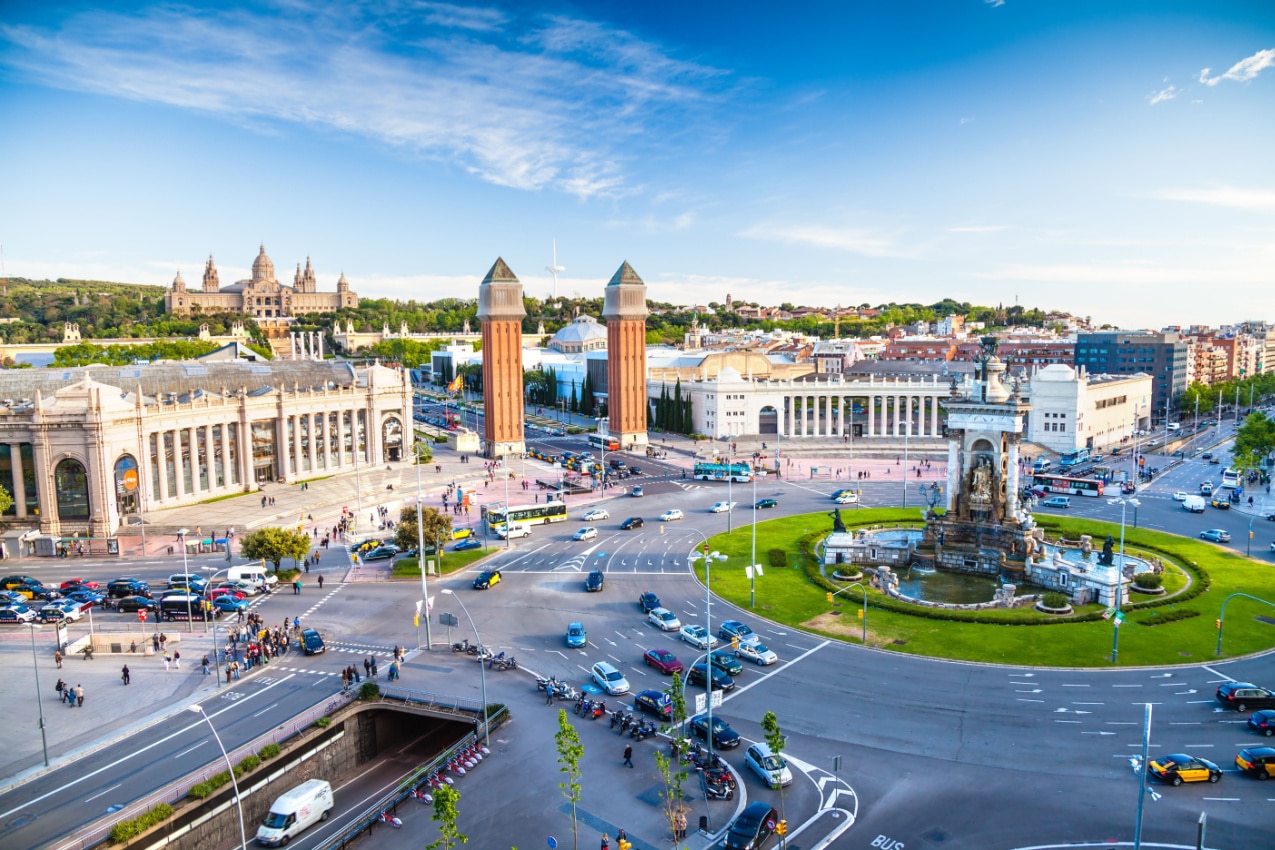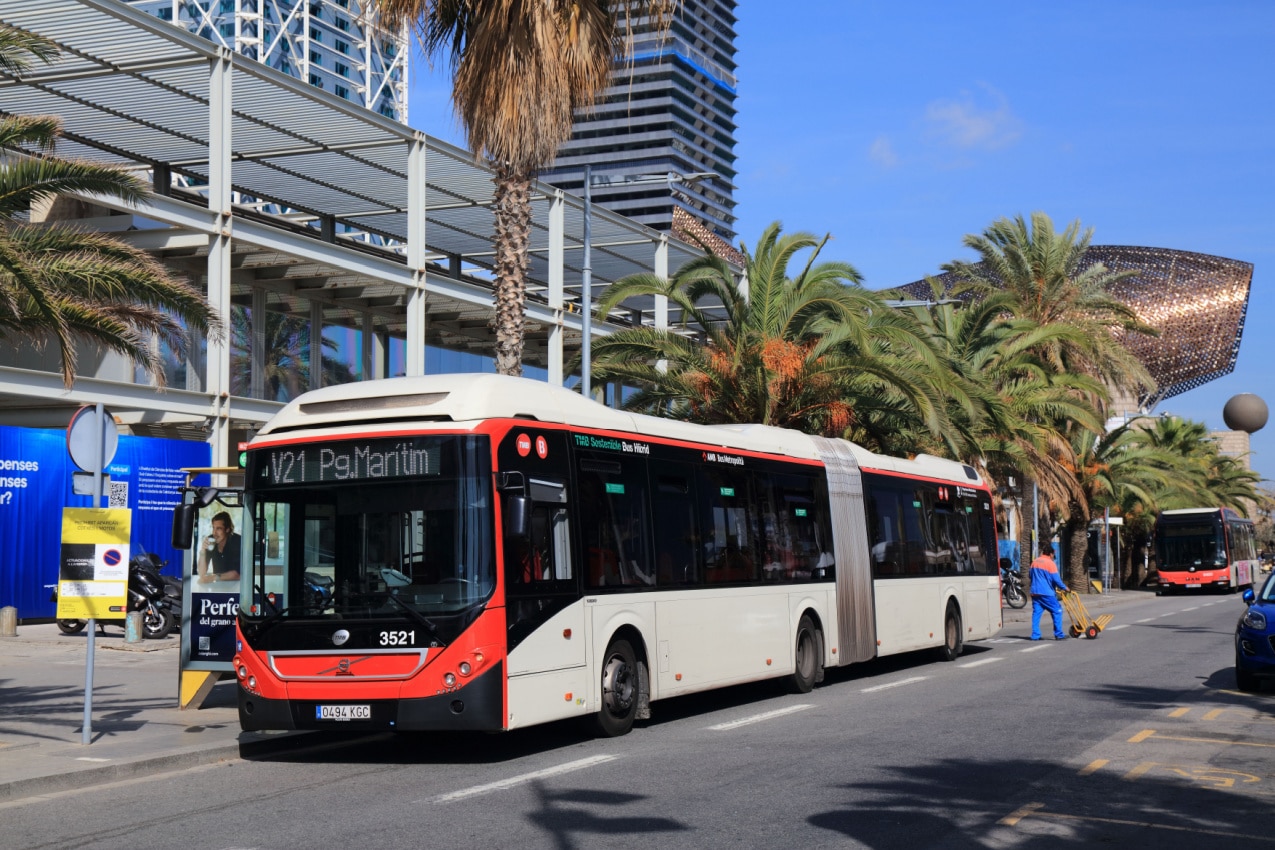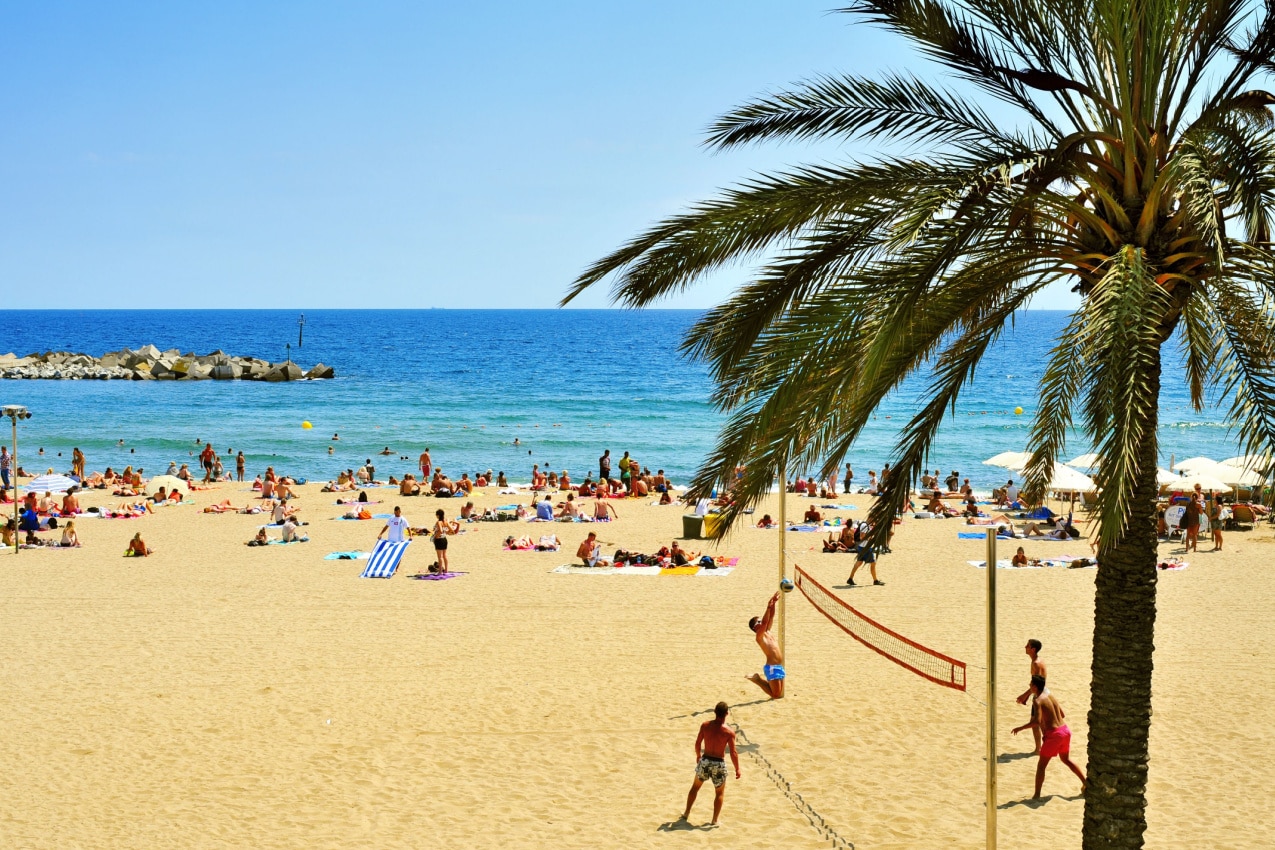Barcelona is a giant magnet for tourists – it attracts 20 million of them yearly. But is this city, as popular as it is, safe for visitors?
Yes! Barcelona is one of the safest destinations to visit. But, like with any tourist hotspot, you have to be smart.
Some areas warrant caution, especially after the sun sets. So, today, we want to give you the rundown of everything you need to keep in mind when you’re visiting Barcelona, from the most prevalent crimes to weather information, public transportation safety, and more.
Are you planning a last minute trip to Barcelona? We’ve put together all the resources you’ll need for a fun & safe travel:
🛌 Best & Safest Places to Stay in Barcelona:
👉 Hotel SOFIA Barcelona – Pets allowed, City view, Daily housekeeping
👉 Ohla Barcelona – City view, Key card access, Daily housekeeping
👉 ME Barcelona – Pets allowed, Key card access, Outdoor swimming pool
👉 Hotel Boutique Mirlo – Tea/coffee maker in all rooms, Free WiFi, Restaurant
⛱️ Fun Activities & Tours in Barcelona:
👉 Barcelona Tapas and Wine Experience Small-Group Walking Tour
👉 City Sightseeing Barcelona Hop-On Hop-Off Bus Tour
👉 Hot-Air Balloon Flight Over Catalonia with optional Pick-up from Barcelona
🚗 Best & Safest Barcelona Transportation Services:
👉 Airport Pickup Service – Welcome Pickups
👉 Rent a Car – DiscoverCars
🙏 Stay Safe While Travelling:
👉 Safetywing (for medical insurance)
👉 VisitorsCoverage (for trip insurance)
Is Barcelona Safe?

Barcelona made it to the top 20 safest destinations globally in 2020, ranking 11th according to the Economist! With a safety index of 77.8, it outshines other iconic destinations like New York (77.8), London (77.2), and Paris (74.3).
This is just the tip of the iceberg. Here’s what we found:
- Both Canada and the United States give Barcelona some of the mildest travel warnings
- Its crime rating is moderate—51.18 according to Numbeo
- The most common crime is theft of bags or wallets
- The most crime-concentrated district is Ciutat Vella
- Local transit is safe and efficient, but at night, take a taxi
- Spain has one of the top healthcare systems in the world
- It’s safe for solo travelers, but there is the risk of petty crime
- Apart from storms and heatwaves, Barcelona is not at risk from devastating natural disasters
- Carbon monoxide poisoning is a risk, so bring a portable CO detector in case your accommodation doesn’t have one
- Keep an eye on the beach warning flags—they come in different colors, each signaling a different safety level
Travel Advisory for Spain
According to the U.S. Department of State travel advisory, travelers need to “Exercise Increased Caution” in Spain due to the possibility of crime. Still, the chances of anything happening during your vacation are pretty low, so you can travel confidently if you exercise caution.
The Canadian Government advises tourists to “Take Normal Precautionary Measures,” which is the mildest safety advisory. The Canadian travel advisory highlights that the most prevalent crimes tourists can be exposed to are pickpocketing and purse snatching, home burglaries, scams, fraud, and spiked food and drinks.
If you’re planning a trip to Barcelona, it’s good to know that both the U.S. and Canada consider this destination safe for travelers. While the chances of any issues are pretty low, like in any country, it’s always smart to be cautious.
A Comprehensive Look at Barcelona Crime Rates
Barcelona has a moderate crime rating of 51.18.
The most common crimes revolve around personal safety, with the most prevalent being the theft of bags or wallets.
Crime rate surveys reveal where these crimes are most likely to happen: open public spaces take the lead, with nearly half of the crimes occurring there, followed by public transport. Ciutat Vella is the district with the most incidents, recording 122 crimes per 100 inhabitants, followed by Eixample, with 44.1 crimes per 100 inhabitants. Keep your eyes open in these areas!
| Safety Concerns | Crime Rate | Status |
| Overall Crime Level | 56.50 | Moderate |
| Increase in Crime (Past 3 Years) | 76.83 | High |
| Home Break-Ins and Thefts | 47.95 | Moderate |
| Mugging and Robbery | 58.65 | Moderate |
| Car Theft | 34.70 | Low |
| Theft from Vehicles | 51.37 | Moderate |
| Personal Attacks | 46.19 | Moderate |
| Verbal Insults | 42.45 | Moderate |
| Racial, Ethnic, Gender, or Religious-Based Attacks | 27.99 | Low |
| Drug Use and Dealing | 59.98 | Moderate |
| Property Crimes (Vandalism and Theft) | 63.10 | High |
| Violent Crimes (Assault and Armed Robbery) | 46.60 | Moderate |
| Corruption and Bribery | 56.02 | Moderate |
| Safety Walking Alone in Daylight | 68.73 | High |
| Safety Walking Alone at Nighttime | 42.52 | Moderate |
Police Presence in Barcelona
In Barcelona, the ‘Guardia Urbana’ plays a big part in maintaining order and security throughout the city. Their responsibilities, ranging from traffic control to dealing with antisocial behavior and ensuring the security of public spaces, play a crucial role in creating a safe environment for both residents and visitors.
The Guardia Urbana are approachable and easy to talk to, especially in tourist hotspots where the great majority of officers speak English. If you’re ever in danger or just need help with directions, they’re there for you. Their emergency number is 092.
Public Transportation Safety in Barcelona

Barcelona has a fantastic public transport system that makes zipping from one place to another super convenient. However, public transportation is a hub for petty crime, so be extremely cautious when you’re using public transport to get around town.
Barcelona’s metros and trains run at breakneck speed, so you don’t have to be concerned with timetables. Other choices for local transportation in Barcelona include city buses, cable cars, funicular trains, and sightseeing buses.
Metro and FGC Railway stations have ticket machines or booths and if you’re hopping on a bus, you can just grab a ticket from the driver. The metro and buses usually run from 5 am to 2 am, and night buses run until the morning—still, hopping on one late at night might not be the best idea, as you may bump into not-so-friendly characters.
Opt for a taxi instead. The biggest taxi service in Barcelona is Radio Taxi 033. Their number is +34 933 033 033. A taximeter regulates the taxi prices in this city, so you don’t have to worry that you’ll be overcharged. The colors of the cars are black and yellow. Uber is also available in Barcelona, so that’s another option you can consider.
Medical Care Quality in Barcelona
Spain boasts one of the world’s best healthcare systems—the World Health Organization ranked it 7th globally in 2009. If you ever need medical help in Barcelona, know that you’re in good hands—some of the finest in the world!
Barcelona has 58 hospitals in town, including 12 public and 46 private ones.
The main hospitals are Hospital del Mar, Hospital Clínic, Hospital Universitari de la Vall d’Hebron, and Hospital de la Santa Creu i Sant Pau. These hospitals provide emergency services, exceptional medical experts, and cutting-edge medical technology.
Is It Safe to Travel Solo in Barcelona?

Barcelona is one of the safest places worldwide, so you can explore the city solo without any worries.
Police are reliable, friendly to tourists, and here to help you with any safety issues. Medical facilities are top-notch. Getting from point A to point B is very easy thanks to the efficient public transport. Taxis are reliable and won’t overcharge you.
Still, you can’t underestimate the risk of pickpocketing and petty theft. While the city does a great job at keeping residents and tourists safe, you also have a responsibility to be street-smart and cautious while traveling. That means sticking to well-lit spots, keeping your belongings close or in a safe spot, not roaming around alone at night (especially if you’re female), and not engaging with strangers.
Perils of Nature: The Risk of Natural Disasters in Barcelona
Barcelona rarely faces extreme weather. No hurricanes, tornadoes, earthquakes, volcanoes. But every now and then, the city might experience heavy rainfall and heatwaves.
Storms
The peak season for storms in Barcelona happens in the fall and winter—when rain is most prevalent. Storms can bring floods, thunder, and gusty winds. The most recent major storm hit in May, flooding highways and metro stations.
If a storm happens during your visit, stay in your hotel, avoid driving, and keep an eye on weather updates. Your outdoor plans might need to wait, but you can relax indoors, catch up on a series, and wait for the sun to return.
Heatwaves
Barcelona can get seriously hot in the summer. Temperatures can hit the high 90s or even low 100s°F (30s/40s°C).
While the city is safe in the heat, you want to be smart—too much sun can bring heat exhaustion and make you feel dizzy, and there’s also the risk of heatstroke—the symptoms are high body temperature, confusion, fast pulse, and eventually passing out.
So remember to hydrate, rest in the shade, drink water, and avoid being outside during the hottest period of the day.
Beware the Silent Threat: Carbon Monoxide Poisoning in Barcelona
In 2013, during a concert in Barcelona, 35 people got carbon monoxide poisoning due to faulty heaters. Most cases were mild, but three were serious. Another incident in 2021 hit about 60 kids and nine adults at a holiday camp in Barcelona.
It’s not just Barcelona—this can happen anywhere, from an Airbnb in Mexico City or a church in Paris to a hotel in London or in Amsterdam.
This deadly gas can leak from heaters, stoves, or furnaces when they aren’t well-vented. Exposure to the gas in an enclosed space can make you dizzy, knock you out, or, in extreme cases, be fatal.
Officials say every room needs a CO detector, from bedrooms to big venues. When in Barcelona, ask if your hotel has one. They monitor air quality and warn if there’s dangerous gas. For extra safety, carry a portable CO detector. They’re not pricey (around $20), so they’re a good investment for traveling.
The Safety of Barcelona Beaches

Barcelona’s beaches are stunning, but watch out for pickpockets. If you’re visiting the beach alone and want to get into the water, kindly ask someone who seems reliable to you to watch out for your things while you’re in the water—families are the wisest option! Don’t bring anything but the essentials to the beach, which means a photocopy of your passport, sunscreen, snacks, and a bit of cash—nothing else.
Barcelona’s beaches use the flag system:
Green: An all-clear sign indicating that it’s safe to swim.
Yellow: Potentially high surf or dangerous currents and undertows, means that swimmers should exercise extreme caution.
Red: Serious hazards or conditions are too dangerous for even the strongest swimmers, so swimming is not allowed.
Black: The beach is closed due to the state of sea and sand.
Barcelona’s beaches might seem inviting in fall and winter, but the waves can be unpredictable, so it’s best to be careful along the water’s edge. If there are severe weather warnings, it’s best to steer clear of beaches and coastal areas altogether.
Barcelona Weather Patterns: What to Expect
In Barcelona, the warm season is from June to September, with daily highs averaging above 75°F (23.8°C), peaking in August at around 76°F (24.4°C).
The cold season is longer, running from November to March. The average daily highs during this season drop below 54°F (12.2°C), hitting a low in January at 47°F (8.3°C).
From June to September, Barcelona enjoys nothing but clear skies and dry weather, especially in July (84% clear and 0.8in/20.32mm of rain). The days get more cloudy from September and are common until May, with October being the cloudiest (45% overcast and 2.4in/60.96mm of rain).
Monthly Average Temperatures in Barcelona
| Month | Fahrenheit (°F) | Celsius (°C) |
| January | 47 | 8.3 |
| February | 49 | 9.4 |
| March | 53 | 11.6 |
| April | 56 | 13.3 |
| May | 62 | 16.6 |
| June | 70 | 21.1 |
| July | 75 | 23.8 |
| August | 76 | 24.4 |
| September | 71 | 21.6 |
| October | 63 | 17.2 |
| November | 54 | 12.2 |
| December | 48 | 8.8 |
When Is the Best Time to Visit Barcelona?
Barcelona’s a beauty year-round, but we’d say the best times to visit it are in spring (April to June) and fall (September to October). The weather’s warm and perfect for exploring the city without the overwhelmingly big crowds the city gets during the summer.
Still, there’s no bad time to visit Barcelona. The best time for you will depend on your priorities. Here’s the lowdown:
Best weather: Barcelona boasts the finest weather from late May to early October. This is the time to experience Barcelona’s beaches to the fullest, especially in July and August, when the sea is the warmest. But just a heads up: this is also peak season, meaning the city and its beaches will be buzzing with crowds. And yep, prices for flights, hotels, and city tours take a little spike too.
Honeymoon: For a dreamy honeymoon in Barcelona, aim for late spring (May and June) or early fall (September and October). The city is not as crowded as in peak summer, so it has a more intimate vibe.
Avoiding crowds: Winter (January-February) and early spring (March) are the quietest and most budget-friendly seasons. No need to rush before museum tickets sell out and accommodations come with pocket-friendly prices.
Shopping season: The biggest sales are usually in the summer, from July to August, and in winter, from early January all through February.
How to Stay Safe in Barcelona
- Avoid spots where protests are happening, such as around the central squares Plaça de Catalunya and Plaça Sant Jaume or the major avenue Passeig de Gràcia.
- Thieves are most active in airports, public transport spots, hotels, restaurants, beaches, and tourist spots
- Keep your belongings, especially passports, secure—get a copy of your passport to take with you everywhere and leave the original safe in your accommodation
- Carry only essentials at the beach
- Watch your luggage everywhere—airports, car rentals, hotels
- Be cautious with online friendships or romances—they might not be what they seem
- Don’t accept drinks like snacks or drinks from a stranger—they might contain substances that could put you at risk of harm.
- Keep your credit card PIN secret—cover the keypad with one hand when you’re using an ATM.
- Stick to ATMs in public spots, like malls, or inside banks.
Emergency Numbers
- Police, ambulance, fire brigade: 112
- Police: 091
- Fire brigade: 080
- Emergency Ambulance: 061
FAQ
In Barcelona, thieves are the most active at the following locations:
Barceloneta Beach
El-Prat airport
Airport shuttle bus (the Aerobus)
Güell park
The Las Ramblas street
The Passeig de Gràcia shopping street
The Plaça de Catalunya central square
The Plaça Reial old city square and the surrounding streets
Sants train and bus station
The subway system
Barcelona’s tap water is safe to drink. It meets all the safety standards set by the European Union and the World Health Organization.
Over and Out!
Barcelona proudly sits among the top 20 safest destinations worldwide and is categorized as safe by both the U.S. and Canadian travel advisories. Feel free to start packing!
Still, it’s wise to stay alert. Keep an eye out for pickpockets, especially in crowded tourist areas. Stay vigilant in metro and train stations, particularly after dark. Safe travels!



